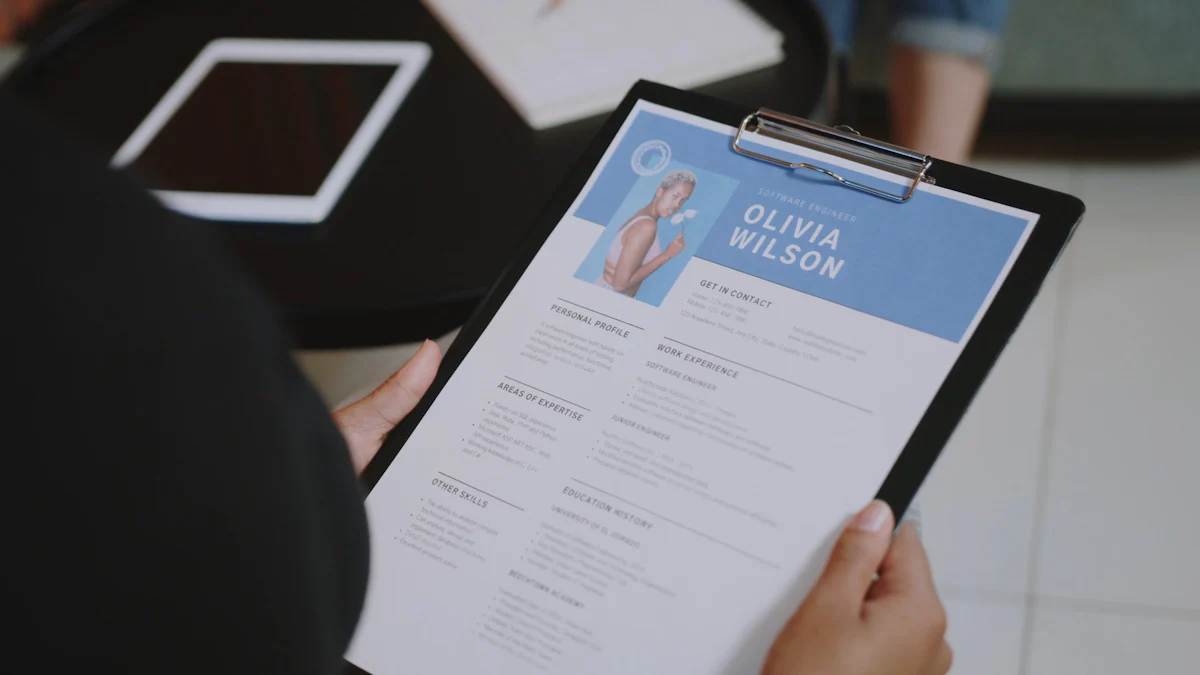20 Powerful Words to Replace Improving on Your Resume
Try Aihirely for
Smarter Interview Prep
Experience real-time AI support tailored to your Resume.
Boost your confidence and ace every question with
AI Mock Interview.

Image Source: pexels
Have you ever noticed how often the word “improving” pops up on resumes? It’s everywhere! While it might seem harmless, it doesn’t pack much punch. Recruiters want to see action. They want to know what you’ve done, not just that you’ve “improved” something.
Action verbs show what you do (not just who you are). They describe doing something, not any state of being. For example, instead of saying “I was the general manager,” you could say “I supervised and managed the operation.” This small change makes a significant impact.
Using a better word for improving on resume can make your achievements shine. Action verbs grab attention, highlight your skills, and even help your resume pass applicant tracking systems.
| Benefit of Action Verbs | Description |
|---|---|
| Improve Readability | Action verbs make resumes easier to scan and read, capturing attention quickly. |
| Enhance ATS Compatibility | Using action verbs increases the chances of passing through applicant tracking systems. |
| Showcase Accomplishments | They elevate existing accomplishments, making candidates stand out. |
So, ditch the generic terms. Choose words that show your impact and make your resume unforgettable.
Key Takeaways
-
Swap plain words like ‘improving’ with strong action verbs.
-
Use numbers to show how your work made a difference.
-
Match your action verbs to the job description to show you understand the role.
Why Replace Improving?
The drawbacks of using generic terms like ‘improving.’
Using “improving” on your resume might seem harmless, but it often works against you. Why? It’s overused. Recruiters see it so often that it starts to feel like a buzzword. Instead of standing out, your resume blends in.
Generic terms like “improved” don’t tell the full story. They lack specifics. For example, saying you “improved team workflow” doesn’t explain how you did it or what the results were. Did you save time? Boost productivity? Without details, your achievements lose impact.
Specific and quantifiable terms make a stronger impression. They show exactly what you did and the results you achieved. This approach helps recruiters understand your value at a glance.
How specific action verbs create a stronger impression.
Action verbs bring your resume to life. They show action, not just intention. For example, instead of saying you “improved sales results,” you could say you “intensified sales results by implementing targeted marketing campaigns.” This paints a clearer picture of your role and impact.
Here’s a comparison:
| Before (Improved) | After (Stronger Verb) | Impact |
|---|---|---|
| Improved website performance | Advanced website performance by integrating efficient code | 30% increase in site speed |
See the difference? Stronger verbs make your achievements more compelling.
The role of impactful verbs in capturing recruiter attention.
Recruiters spend seconds scanning resumes. Impactful verbs grab their attention. Words like “optimized,” “elevated,” or “fortified” stand out. They show confidence and competence. Using a better word for improving on resume can make your skills and achievements shine.
When you use specific, action-packed verbs, you’re not just listing duties. You’re telling a story about your success. That’s what gets you noticed.
20 Powerful Words to Replace Improving

Image Source: pexels
Leadership and Management Context
When it comes to leadership and management, you need words that show your ability to take charge and deliver results. Instead of saying you “improved” something, try using words that highlight your specific contributions. For example:
| Original Word | Powerful Alternative | Example Usage |
|---|---|---|
| Improved | Intensified | Intensified sales results by implementing targeted marketing campaigns, boosting quarterly sales by 22%. |
| Improved | Simplified | Simplified process complexity by eliminating redundant steps in the assembly line process, thus increasing overall productivity by 28%. |
| Improved | Pioneered | Pioneered a revamped strategy that led to a significant change in user behavior and a 15% increase in user retention in the first quarter. |
| Improved | Galvanized | Galvanized team motivation by restructuring the reward system, effectively improving employee satisfaction by 18%. |
These words not only replace “improving” but also show how you made a measurable impact. They make your leadership skills stand out.
Creativity and Innovation Context
If you’re showcasing creativity and innovation, you need words that reflect originality and forward-thinking. Here are some better alternatives:
-
Pioneered: Pioneered a new design approach that increased user engagement by 25%.
-
Embellished: Embellished the product’s visual appeal, leading to a 35% boost in customer satisfaction.
-
Enriched: Enriched the app’s functionality by adding user-friendly features, increasing downloads by 20%.
-
Honed: Honed the creative process by introducing brainstorming workshops, resulting in more innovative ideas.
These words show that you’re not just improving but actively driving change and innovation.
Problem-Solving and Analytical Context
For problem-solving roles, you want words that demonstrate your ability to analyze and resolve issues effectively. Replace “improving” with:
-
Optimized: Optimized resource allocation, reducing costs by 15%.
-
Resolved: Resolved recurring technical issues, improving system uptime by 30%.
-
Enhanced: Enhanced data accuracy by implementing a new validation process.
-
Streamlined: Streamlined workflows, cutting project timelines by 20%.
These alternatives highlight your analytical skills and problem-solving abilities.
Teamwork and Collaboration Context
Teamwork is all about working together to achieve goals. Instead of “improving,” use words that show your role in team success:
-
Facilitated: Facilitated cross-departmental collaboration, leading to a 10% increase in project efficiency.
-
Unified: Unified team efforts by introducing shared goals, boosting morale and productivity.
-
Strengthened: Strengthened team dynamics through effective communication strategies.
-
Coordinated: Coordinated team activities, ensuring timely project delivery.
These words emphasize your ability to work well with others and contribute to team achievements.
Personal Growth and Development Context
When discussing personal growth, choose words that reflect your journey and dedication. Here are some options:
| Synonym | Description | Example Sentence |
|---|---|---|
| Self-Development | The act of improving oneself through various activities | He dedicated time each day to self-development and learning. |
| Self-Enhancement | The act of increasing one’s own abilities or qualities | Self-enhancement is a key part of his daily routine. |
| Self-Actualization | The realization or fulfillment of one’s talents and potentialities | Through her journey, she achieved self-actualization and inner peace. |
| Self-Refinement | The act of refining or improving oneself, especially in manners or skills | She practiced self-refinement through continuous education. |
These words show that you’re committed to growth and self-improvement, making your resume more compelling.
How to Use a Better Word for Improving on Resume

Image Source: pexels
Matching action verbs to job descriptions
Matching action verbs to job descriptions is key to making your resume stand out. You want to tailor your verbs to the role and industry you’re applying for. This shows recruiters that you understand the job and have the skills they need.
Here’s how you can do it:
-
Use present tense verbs for current roles and past tense for previous ones.
-
Avoid vague words like “helped” or “worked on.” Instead, use specific verbs like “executed” or “designed.”
-
Focus on measurable action verbs that highlight your impact.
For example, if the job description mentions “team leadership,” you could use verbs like “coordinated” or “mentored.” This approach makes your resume more relevant and impactful.
Quantifying achievements for maximum impact
Numbers speak louder than words. When you quantify your achievements, you give recruiters a clear picture of your contributions. Pairing action verbs with measurable results makes your resume shine.
Here are some examples:
-
“Streamlined production workflow, surpassing team output goals by 25%.”
-
“Diminished compliance risks, resulting in zero audit failures.”
Adding numbers to your accomplishments shows the value you bring to the table. It’s a simple way to make your resume more compelling.
Avoiding redundancy and overuse of action verbs
Using action verbs is great, but overdoing it can hurt your resume. Repeating the same verbs or adding unnecessary adverbs makes your writing feel repetitive.
For instance, instead of saying “shouted loudly,” just say “shouted.” Strong verbs like “examined” or “accelerated” eliminate the need for extra words. Keep your language concise and varied to maintain the reader’s interest.
Ensuring verbs reflect your actual experience
Honesty is crucial when choosing action verbs. Make sure the words you use accurately reflect your experience. If you “led” a project, say so. But if you only “assisted,” don’t exaggerate.
Recruiters can spot inflated claims, and it could hurt your chances. Stick to verbs that match your role and responsibilities. This builds trust and ensures your resume aligns with your real skills.
Replacing “improving” with specific action verbs transforms your resume. It highlights your accomplishments, avoids overused language, and shows you’ve tailored your application to the job. Strong verbs make your contributions stand out, helping recruiters see your potential. Update your resume today—those impactful words could be the key to your next opportunity!
FAQ
What are action verbs, and why do they matter on a resume?
Action verbs describe specific actions you’ve taken. They make your resume dynamic and engaging. Recruiters prefer them because they highlight your achievements and skills clearly.
Can I use the same action verb multiple times?
It’s better to vary your verbs. Repeating the same word can make your resume feel monotonous. Use synonyms or context-specific verbs to keep it fresh.
Tip: Use a thesaurus to find alternatives for overused verbs like “improved” or “managed.”
How do I choose the right action verb for my experience?
Match the verb to your role and accomplishments. For example, use “streamlined” for efficiency improvements or “mentored” for leadership roles. Tailor verbs to the job description.
Note: Always ensure the verb accurately reflects your actual experience.
